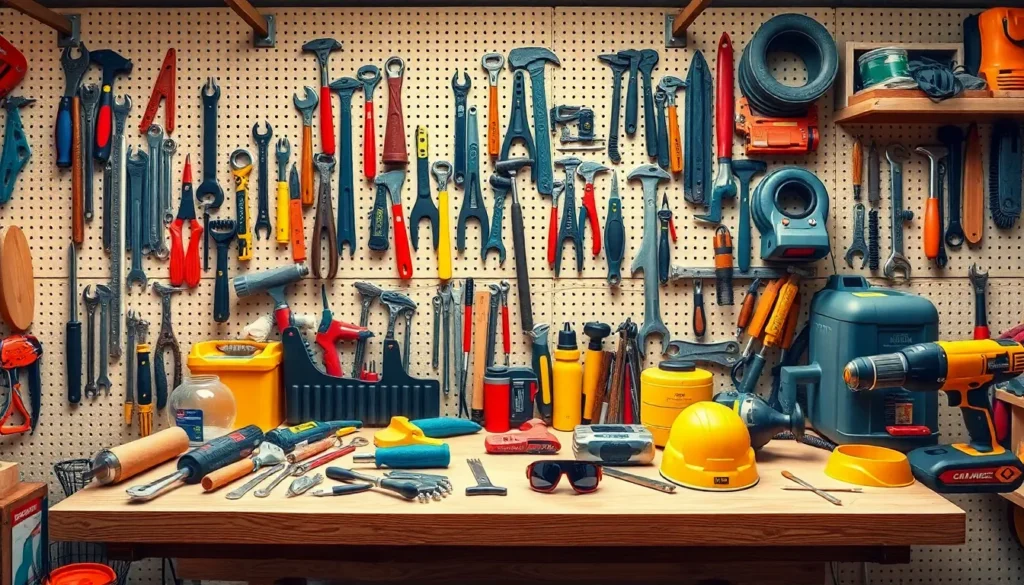Table of Contents
ToggleEvery DIY enthusiast knows that a well-stocked workshop is like a knight’s armor—essential for conquering any project. Whether you’re a weekend warrior or a seasoned pro, having the right tools can mean the difference between a masterpiece and a complete disaster. Imagine trying to build a bookshelf with just a butter knife and a roll of duct tape. Not pretty, right?
Essential Workshop Tools
A well-equipped workshop enhances efficiency and project quality. The following essential tools simplify tasks and improve results.
Hand Tools
Hand tools play a crucial role in any workshop. A hammer is often needed for driving nails and assembling materials. Screwdrivers are essential for inserting or removing screws, with various sizes available for different needs. Pliers help grip and twist materials, offering versatility in various tasks. Wrenches ensure proper tightening of bolts, providing stability in projects. Additionally, a quality saw, whether hand saw or coping saw, aids in cutting wood with precision.
Power Tools
Power tools significantly increase productivity. A cordless drill simplifies drilling holes and driving screws, saving time and effort. Circular saws offer swift cuts for lumber, making them ideal for construction tasks. Sanders smooth surfaces efficiently, reducing manual labor required for finishing. Additionally, table saws allow for straight and accurate cuts, increasing safety and precision when working on larger projects. An angle grinder can also prove invaluable for cutting and grinding materials.
Measuring and Marking Tools
Measuring and marking tools ensure accuracy in all projects. A tape measure allows for quick measurements of length and width, essential for planning layouts. Levels help maintain straight lines and flat surfaces, critical for framing and construction. A square ensures angles are perfectly aligned, preventing mistakes. Marking tools, like chalk lines or pencils, assist in creating clear guidelines for cutting and assembly. These tools, when used together, lead to precise work and significantly reduce errors.
Specialized Workshop Tools


Specialized tools enhance a workshop’s capabilities, allowing for precise and efficient project execution. Depending on the type of work, certain tools become essential.
Woodworking Tools
Woodworking tools play a crucial role in crafting furniture and structures. Saws like miter saws and jigsaws cut various angles and curves. Planers and chisels refine wood surfaces to achieve smooth finishes. Routers shape edges and create intricate designs. Drill presses offer precision when drilling holes in wood, while clamps secure workpieces, ensuring stability during assembly.
Metalworking Tools
Metalworking tools are vital for fabricating and repairing metal projects. Lathes shape metal pieces with precision and accuracy. Welding machines join metal components using heat, enabling strong connections. Angle grinders and cutting torches cut or grind metal to specific dimensions. Drill presses also provide the necessary accuracy for creating holes in metal, while toolboxes organize this diverse range of equipment effectively.
Automotive Tools
Automotive tools facilitate vehicle maintenance and repair. Socket sets allow access to various engine parts with ease. Wrenches provide the necessary leverage for loosening or tightening components. Diagnostic scanners analyze vehicle systems and identify problems. Jump starters offer portable power for dead batteries, while floor jacks lift vehicles safely for access to undercarriages. Each tool plays a vital role in ensuring efficient automotive work.
Safety Equipment
Safety equipment is essential for maintaining a secure workshop environment. Using proper safety gear can prevent injuries and accidents while working on projects.
Personal Protective Equipment
Personal protective equipment (PPE) includes items like safety glasses, ear protection, gloves, and respiratory masks. Safety glasses protect eyes from debris and dust. Ear protection reduces noise exposure from power tools. Gloves safeguard hands from sharp objects and chemicals. Respiratory masks provide defense against harmful dust or fumes. Each component of PPE plays a significant role in ensuring a safe working space.
Safety Gear and Accessories
Safety gear and accessories further enhance workshop safety. Fire extinguishers provide immediate response to fires, while first aid kits address minor injuries quickly. Safety signs alert users to hazards and appropriate precautions. Non-slip mats improve footing in areas prone to spills. Adequate lighting helps prevent accidents by illuminating workspaces. Investing in these safety tools fosters a secure environment for all projects.
Maintenance of Workshop Tools
Maintaining workshop tools is crucial for ensuring longevity and optimal performance. Proper upkeep enhances safety and efficiency during projects.
Cleaning and Care
Regular cleaning prevents dirt and debris buildup on tools. Every tool deserves a specific cleaning routine. For instance, wiping bladed tools like saws and chisels with a cloth after use keeps them sharp. Oil-based lubricants work best for moving parts on power tools, reducing friction and wear. Storing tools in a dry environment protects them from rust. It’s advisable to use separate containers for small hand tools to avoid misplacement. Performing routine cleaning promotes better functionality in every workshop task.
Regular Inspections
Routine inspections identify potential issues before they become significant problems. Checking tools for signs of wear including cracks or dull edges enhances safety. It’s important to examine cords on power tools for fraying, as faulty cords can pose hazards. Tightening loose screws or fittings can prevent accidents and ensure tools function correctly. Typically, performing these inspections monthly minimizes unexpected breakdowns. Creating a schedule for inspections helps keep track of maintenance tasks, ensuring that the workshop remains fully operational. Regularly current tool conditions contribute to productive and safe projects.
A well-equipped workshop is essential for any DIY enthusiast aiming to tackle projects with confidence and precision. The right tools not only improve efficiency but also enhance the overall quality of work. Investing in a variety of hand tools power tools and specialized equipment ensures that any task can be approached with the right resources at hand.
Additionally prioritizing safety and maintaining tools can lead to a more enjoyable and productive experience. By following the guidelines outlined in this article anyone can create a workshop that meets their needs and fosters creativity. With the right preparation a world of DIY possibilities awaits.




